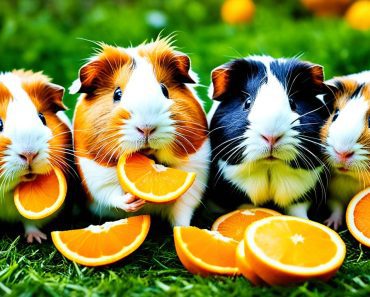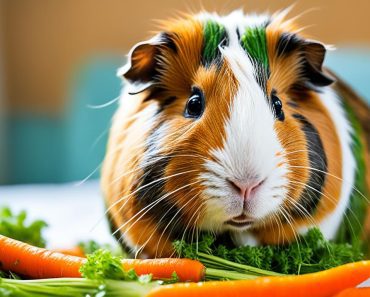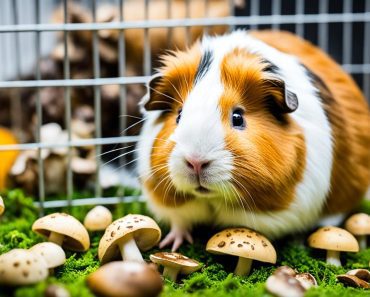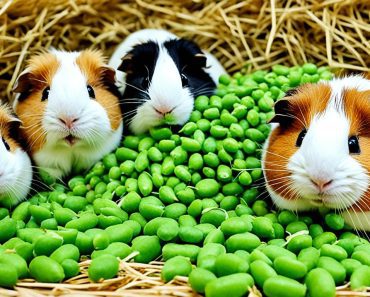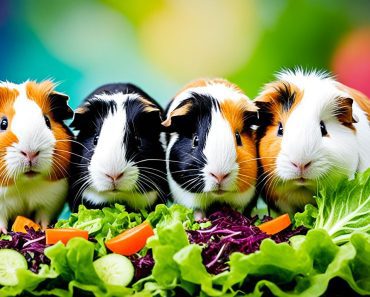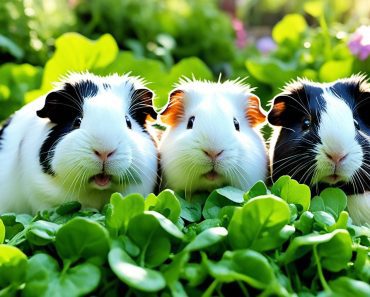Hey there, fellow guinea pig parents! Today, I want to talk about a popular veggie in our kitchens and whether it’s safe for our furry friends to munch on: broccoli. As responsible guinea pig owners, it’s crucial to ensure that our little pals have a nutritious and well-balanced diet, so let’s dive into the topic of guinea pigs and broccoli.
Can Guinea Pigs Eat Broccoli? The short answer is yes – on occasional basis.
- Broccoli is safe for guinea pigs to eat, but should only be given as a treat in small quantities.
- It is rich in essential nutrients such as vitamin C, vitamin E, vitamin K, and fiber.
- However, excessive consumption can lead to health issues like bladder stones due to its high calcium content.
- Offer a variety of safe vegetables alongside broccoli to ensure a balanced guinea pig diet.
- Remember to consult with a veterinarian for personalized advice on your guinea pig’s diet.
The Nutritional Benefits of Broccoli for Guinea Pigs
Broccoli is a nutritious treat for guinea pigs that offers various health benefits. As a rich source of vitamin C, it plays a crucial role in supporting their overall well-being. Since guinea pigs cannot produce their own vitamin C, it is essential to include it in their diet. Broccoli also contains fiber, which aids in digestion and supports a healthy digestive system.
Aside from vitamin C and fiber, broccoli provides other essential nutrients that contribute to a balanced diet for guinea pigs. These nutrients include vitamin K, vitamin E, and various minerals that are vital for their growth and overall health.
“Broccoli is a nutritious treat for guinea pigs that offers various health benefits.”
However, it’s important to feed broccoli in moderation due to its high calcium content. Excessive calcium intake can lead to complications like bladder stones in guinea pigs. To avoid such issues, it’s recommended to offer broccoli as an occasional treat and include a variety of other safe vegetables in their diet.
By providing a balanced nutritional intake, guinea pigs can enjoy the many benefits of broccoli as part of a healthy and fulfilling diet.
Broccoli Nutritional Content for Guinea Pigs
| Nutrient | Amount per 100g |
|---|---|
| Vitamin C | 93.2mg |
| Vitamin K | 101.6mcg |
| Vitamin E | 0.78mg |
| Calcium | 48mg |
| Fiber | 2.6g |
As seen in the table above, broccoli is a rich source of vitamin C, vitamin K, and fiber, making it a beneficial addition to a guinea pig’s diet. However, it’s important to consult with a veterinarian about the ideal portion sizes and suitable combinations of vegetables to ensure a well-rounded and nutritious feeding plan for your guinea pig.
Including Broccoli in Your Guinea Pig’s Diet
When feeding guinea pigs, it’s important to provide them with a balanced diet that includes a variety of vegetables. Broccoli can be a nutritious addition to your guinea pig’s menu, but it should be offered in small quantities and as an occasional treat to ensure their overall well-being.
Feeding Guidelines:
- Offer both the stem and florets of broccoli to provide your guinea pig with a crunchy and nutritious snack.
- Always provide fresh, raw vegetables to ensure maximum nutritional value. Wash them thoroughly to remove any pesticides.
- Never feed cooked broccoli to guinea pigs as it can lose its nutritional benefits and become difficult for them to digest.
- In addition to broccoli, include a variety of other vegetables and fruits in your guinea pig’s diet to ensure a well-rounded nutritional intake.
Why is it important to include other vegetables and fruits?
While broccoli is a great source of essential nutrients, it’s important to offer a diverse range of fruits and veggies to meet all of your guinea pig’s dietary needs. Each type of vegetable and fruit provides different vitamins, minerals, and antioxidants that contribute to your pet’s overall health.
The Benefits of a Varied Diet:
- Guinea pigs require vitamin C in their diet since they cannot produce it on their own. Offering a variety of fruits and veggies helps ensure they receive an adequate amount of this vital nutrient.
- Different vegetables and fruits provide various fiber content, which aids in digestion and prevents issues like constipation.
- A diverse diet promotes healthy eating habits and prevents boredom, keeping your guinea pig excited about mealtime.
A Sample Menu:
| Fruits | Vegetables |
|---|---|
| Apple | Broccoli |
| Grapes | Carrot |
| Strawberries | Kale |
| Blueberries | Cucumber |
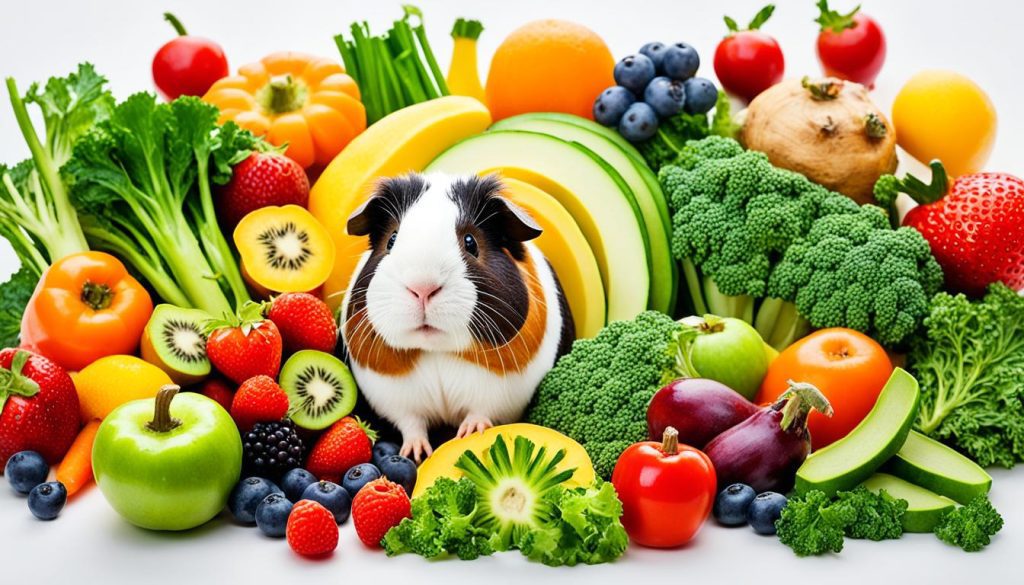
Serving a balanced combination of both fruits and vegetables will ensure your guinea pig enjoys a nutritious and varied diet.
“Adding a variety of fruits and vegetables to your guinea pig’s diet not only meets their nutritional needs but also adds excitement to their daily meals.”
Understanding the Nutritional Content of Broccoli
Broccoli is a highly nutritious vegetable that offers numerous health benefits for guinea pigs. Its rich nutritional profile makes it a valuable addition to their diet. Here’s a closer look at the essential nutrients found in broccoli and how they contribute to guinea pig nutrition.
Vitamin C: Crucial for Guinea Pig Health
One of the standout features of broccoli is its high vitamin C content. Guinea pigs, like humans, are unable to produce their own vitamin C and rely on dietary sources to meet their needs. Vitamin C is an essential nutrient that plays a vital role in maintaining a healthy immune system and promoting overall well-being.
Fiber: Supporting Digestive Health
In addition to vitamin C, broccoli is also rich in fiber. Fiber is crucial for guinea pigs as it aids in digestion and helps maintain a healthy digestive system. It promotes regular bowel movements and prevents gastrointestinal issues, such as constipation and bloating. Including fiber-rich foods like broccoli in their diet can contribute to optimal digestive health for guinea pigs.
Calcium Content: Moderation is Key
While broccoli does contain calcium, it is not as high as other greens like parsley or kale. Excessive calcium intake can lead to health issues, such as bladder stones, in guinea pigs. Therefore, it is important to feed broccoli in moderation as part of a balanced diet. Providing a variety of other vegetables alongside broccoli will help ensure a well-rounded guinea pig diet.
Sugar Levels: Low Compared to Other Vegetables
Broccoli is a vegetable with low sugar content, making it a suitable choice for guinea pigs. Some other vegetables, such as bell peppers and carrots, have higher sugar levels. Including broccoli in their diet helps maintain a balanced intake of nutrients without an excessive sugar load. However, it is still important to feed all vegetables in moderation to maintain a healthy diet for guinea pigs.
Broccoli offers a range of essential nutrients, including vitamin C, fiber, and moderate levels of calcium. When fed in moderation as part of a balanced guinea pig diet, broccoli can contribute to the overall health and well-being of your furry friend.
| Nutrient | Amount per 100g |
|---|---|
| Vitamin C | 89.2mg |
| Fiber | 2.6g |
| Calcium | 47mg |
| Sugar | 1.7g |
Feeding Broccoli Safely to Guinea Pigs
When it comes to feeding guinea pigs broccoli, it’s important to prioritize their safety and well-being. Remember to follow these guidelines to ensure your furry friend enjoys broccoli responsibly and without any negative health effects.
Offer small amounts: Only provide broccoli as a treat or part of a balanced meal. Excessive consumption can lead to health issues like bladder stones, so it’s crucial to offer broccoli in moderation.
Guinea pigs should never be fed cooked broccoli or any other cooked vegetables. The cooking process can alter the nutritional value and even introduce harmful substances that can jeopardize your pet’s health. Stick to providing fresh, raw broccoli.
Additionally, it’s essential to wash all produce thoroughly before feeding it to your guinea pig. This ensures that any potential pesticides or contaminants are removed, reducing the risk of harm.
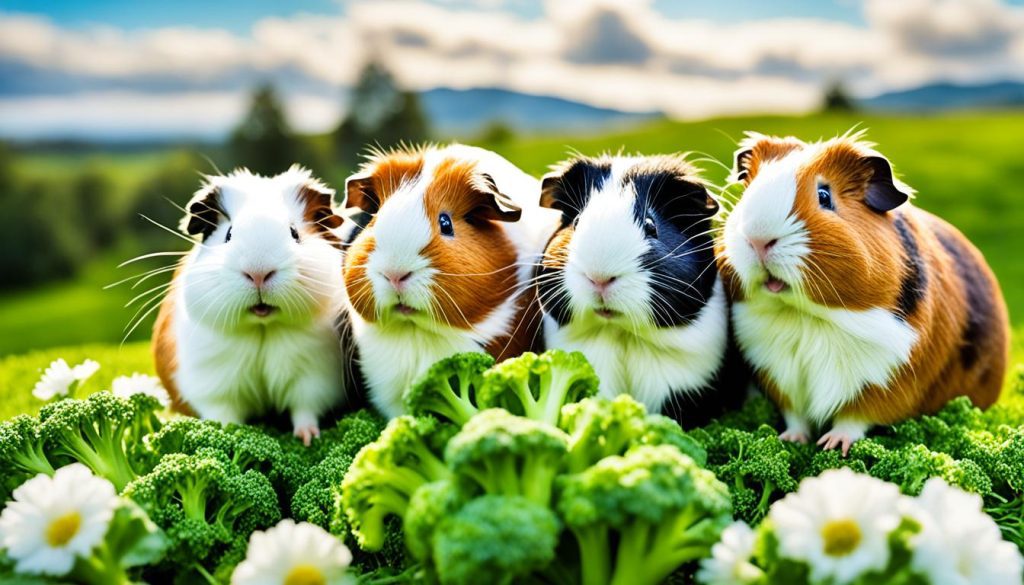
By following these safe feeding practices, you can incorporate broccoli into your guinea pig’s diet without any worries. Remember, maintaining a balanced and varied diet is crucial for their overall health and well-being.
Other Safe Vegetables for Guinea Pigs
While broccoli can be a nutritious addition to a guinea pig’s diet, it is important to offer a variety of other safe vegetables as well. Providing a diverse range of vegetables ensures that guinea pigs receive all the necessary nutrients for their health and wellbeing. Here is a list of some other healthy vegetables that guinea pigs can enjoy:
- Romaine lettuce
- Red and green leaf lettuces
- Mustard or turnip greens
- Cabbage
- Kale
- Cilantro
- Parsley
- Red or green peppers
- Carrots
These vegetables are packed with essential vitamins and minerals that contribute to the overall wellbeing of guinea pigs. Offering a variety of leafy greens ensures a balanced and nutritious diet for your furry friends. Remember to introduce new vegetables gradually and monitor your guinea pig for any signs of digestive upset.
Treat Time: Cabbage and Carrots
While all the vegetables listed above are safe for guinea pigs, there are a couple of favorites that are worth highlighting: cabbage and carrots. Both cabbage and carrots are crunchy, tasty, and provide a good source of nutrients for guinea pigs.
To provide a visual representation, here’s a table of the nutritional content of these vegetables:
| Vegetable | Nutritional Benefits |
|---|---|
| Cabbage | Rich in vitamin C, vitamin K, and dietary fiber. Provides antioxidants that support guinea pigs’ immune system. |
| Carrots | High in beta-carotene, vitamin K, and dietary fiber. Contributes to healthy eyesight and a strong immune system. |
Remember to wash all vegetables thoroughly before offering them to your guinea pigs to remove any dirt or chemical residues. Always introduce new vegetables gradually to prevent any digestive issues, and consult with a veterinarian for specific dietary recommendations for your furry friends.
The Importance of a Balanced Guinea Pig Diet
A balanced diet is crucial for the overall health of guinea pigs. As an owner, it is essential to ensure that your furry friend receives all the necessary nutrients for optimal health and wellbeing. While fresh vegetables are an important component of a guinea pig’s diet, they should be supplemented with other key elements to create a balanced nutrition plan.
First and foremost, grass hay should form the majority of a guinea pig’s diet. Hay provides important fiber, promoting healthy digestion and preventing issues like diarrhea and obesity. It is essential to provide a constant supply of fresh, quality hay for your guinea pig to graze on throughout the day.
In addition to hay, pellets fortified with vitamin C can be included in your guinea pig’s daily feeding routine. These pellets provide additional nutrients and help ensure that your guinea pig receives an adequate intake of vitamin C, which is essential for their health. Pellets should only make up a small portion of their overall diet to avoid overconsumption.
Fresh fruits can also be given to guinea pigs as occasional treats. However, it is important to remember that fruits are high in sugar and should be fed in moderation. Too much sugar can lead to weight gain and dental issues. Offer a variety of fruits and limit the quantity to maintain a balanced diet.
Giving The Best Nutrition:
By providing a balanced diet consisting of hay, vegetables, pellets, and occasional fruit, you can ensure that your guinea pig receives all the necessary nutrients for their optimal health. Here is a breakdown of a balanced guinea pig diet:
- Fresh, quality grass hay: This should make up the majority of their diet and should be available at all times.
- Vegetables: Provide a variety of safe vegetables such as romaine lettuce, red and green leaf lettuces, mustard or turnip greens, cabbage, kale, cilantro, and parsley. These vegetables are low in sugar and rich in essential nutrients.
- Pellets: Choose pellets that are specifically formulated for guinea pigs and fortified with vitamin C. These should only make up a small portion of their diet.
- Fruits: Offer small amounts of fresh fruits as occasional treats. Stick to low-sugar options like strawberries, blueberries, and melons.
Remember to introduce new foods gradually and monitor your guinea pig’s reaction. Some guinea pigs may have specific dietary restrictions or preferences. Consult with a veterinarian to ensure that your guinea pig is on the right track with their nutrition.
“A balanced diet is essential for guinea pigs to thrive. By providing a combination of hay, vegetables, pellets, and occasional fruit treats, you can ensure that your guinea pig receives all the necessary nutrients for a healthy and happy life.” – [Your Name]
Conclusion
Guinea pigs can enjoy broccoli as part of a well-balanced diet. While it provides valuable nutrients like vitamin C and fiber, it should be fed in moderation due to its calcium content. Remember to offer a variety of other safe vegetables to ensure your guinea pig’s nutritional needs are met. By following proper feeding guidelines and consulting with a veterinarian, you can confidently incorporate broccoli into your guinea pig’s care routine.
Providing a balanced guinea pig diet is essential for their overall health and well-being. Alongside fresh vegetables like broccoli, make sure your guinea pig has access to ample grass hay, which should form the majority of their diet. Fortified pellets can also be included, but in smaller amounts. Occasional treats of fresh fruits are acceptable, but be mindful of their sugar content and feed in moderation. Remember, balance is key!
When it comes to caring for your guinea pig, proper nutrition is vital. Offer a variety of safe vegetables, including broccoli, to ensure they receive essential nutrients. Always prioritize the well-being of your furry friend by consulting with a veterinarian for personalized advice regarding their specific dietary needs. With the right care and consideration, you can provide your guinea pig with a happy and healthy life!

